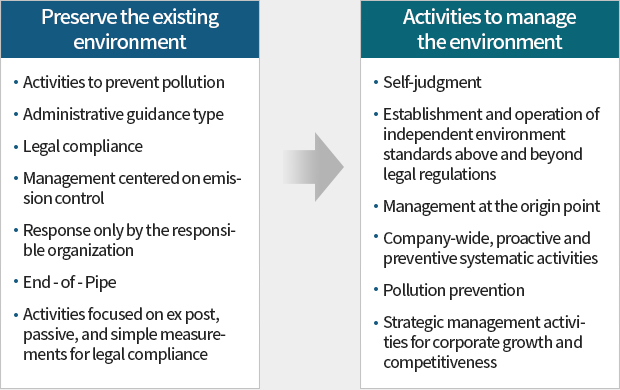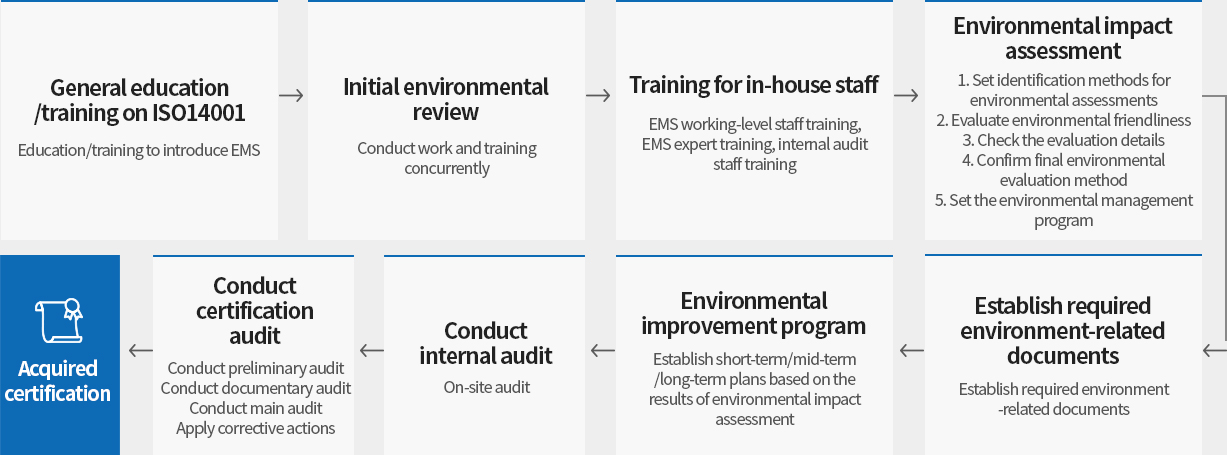Overview
The ISO14001 series was selected as a common standard worldwide to establish the most efficient management system by systematizing all activities and tasks of the organization. It is a certification that objectively proves that energy and resources are consumed and recycled efficiently by minimizing possible adverse environmental impacts.


Introducing the Environmental Management System (EMS)
A system that describes the immediate or long-term impact of products, services and processes on the environment in the overall management structure operated by an organization. An EMS is a management system that provides rules and consistency of organizational methodologies through allocation of resources, assignment of responsibilities, and continuous evaluation of practices, procedures, and processes.

Necessity of EMS
- 1. Most objectively proves whether a company is environmentally friendly
- 2. Growing pressure for environmental management in the international market
- 3. Growing pressure for environmental management in the international market
- 4. Increased consumer preference for environmentally friendly products or products from environmentally friendly companies driven by increased consumer awareness regarding the environment based upon the increasing importance of the environmental
Purpose of introducing EMS

Effects of certification
Public interest in the environment is increasing worldwide due to increasingly severe environmental pollution. As a result, many developed Western countries and leading companies are putting pressure for environmental management. Thus, several domestic companies will not be able to ignore this trend in the future, and therefore ISO 14001 will become an industry-wide standard, similar to ISO 9001.
- 1. Preferential treatment when designated as an “environment-friendly company” by the Ministry of Environment
-
- 1) Substitute the report for permission to install emission facilities pursuant to the Air Environment Conservation Act, Article 10 of the Water Quality Conservation Act, and Article 9 of the Noise and Vibration Control Act
- 2) Priority given when applying for a loan for installation of prevention facilities (SMEs)
- 3) Exemption from non-regular inspections/audits (except when a pollution accident or civil complaint occurs)
- 4) Exemption from regular inspections/audits
- 5) Priority given for various awards
- 2. Government support currently under discussion
-
- 1) &According to the Enforcement Decree of the Regulations on Tax Reduction and Exemption, the Ministry of Finance and Economy is requesting tax reduction or exemption for companies that have obtained certification to include certification maintenance costs (post-management costs) in the current certification acquisition costs (consulting costs, examination costs, etc.).
- 2) Public Procurement Service has been requested to raise the additional number of points given to companies that have obtained certification during the pre-bidding qualification test for public construction works
- 3) Ministry of Trade, Industry and Energy and the Ministry of Labor have been requested to prioritize the placement of foreign industrial trainees to companies that have obtained certification
- 4) Requests have been made to raise the additional number of points for companies that have obtained certification from the Korea Technology Finance Corporation
- 5) Stakeholders are seeking other support measures under relevant laws
- 3. General effects and internal profits upon acquiring the certification
-
- 1) Improved image as an environmentally friendly company
- 2) Reduced environmental complaints from residents and secured customer persuasion
- 3) Lower the possibility of violating environmental laws/regulations
- 4) Stronger ties with stakeholders (government, residents, insurance companies, creditor banks, etc.), and better responses
- 5) Reduced waste treatment costs
- 6) Savings in terms of raw materials and energy
- 7) Reduced cost by ensuring ZERO environment and safety accidents
- 8) Sustained business thanks to the ability to predict and respond to laws and regulations
- 9) Improved self-esteem in terms of improving the environment
- 10) Improved environmental performance and environmental conditions
- 11) Continued reduction and management of environmental impacts
- 12) Improved market competitiveness
- Comparison with ISO9001
-
| Sort |
ISO9001 |
ISO14001 |
|---|
| Management |
Improvement target |
Zero defect |
Zero defect, Emission-free, Pollution-free |
| Principle |
Economic |
Economic, environmental friendliness |
| Evaluation |
Audit |
Accounting audit |
Accounting audit, environmental management system audit, product life cycle audit, emission minimization audit, policy compliance audit, etc. |
| Evaluator |
Clients |
Clients, shareholders, employees, and private organizations |
| Function |
Production |
High quality, increased productivity |
High quality, waste reduction/resource saving/packaging materials, etc. (ecosystem-related interests), energy cost reduction |
| Research and development |
Focus on products |
Considerations from raw materials to final disposal and recycling |
| Marketing |
Increase in market share |
Zero defect, Emission-free, Pollution-free |
ISO 14001 implementation procedure



